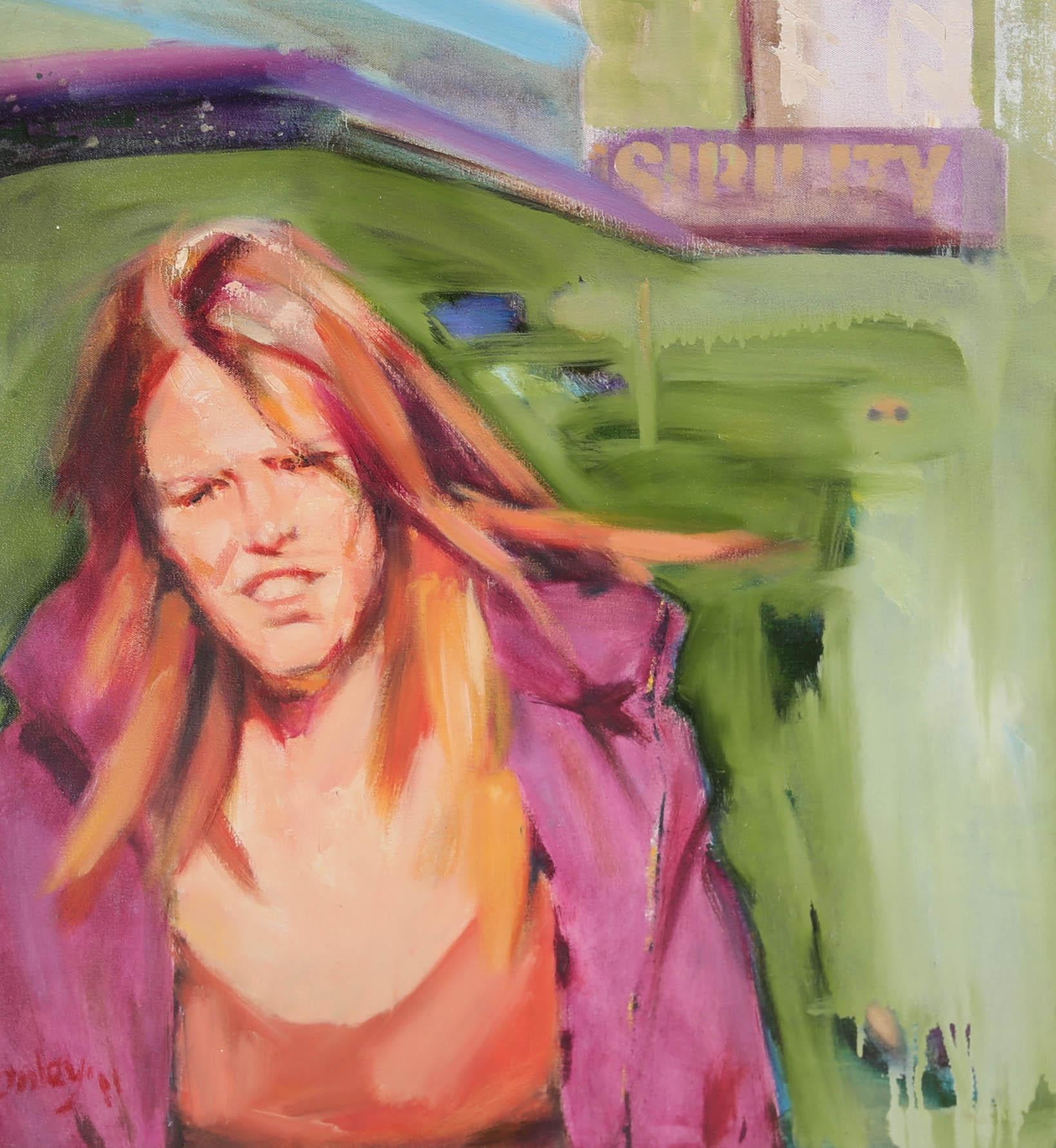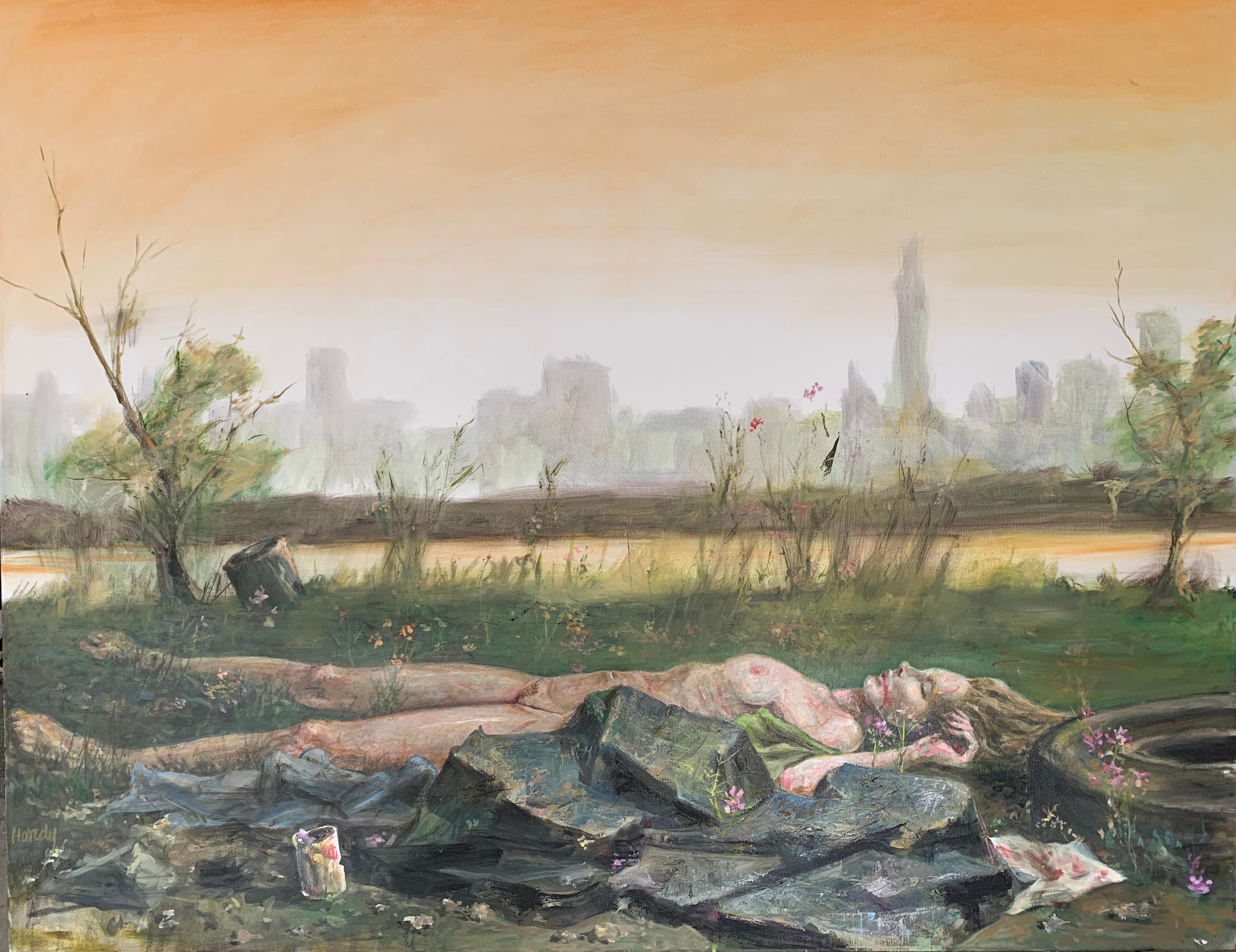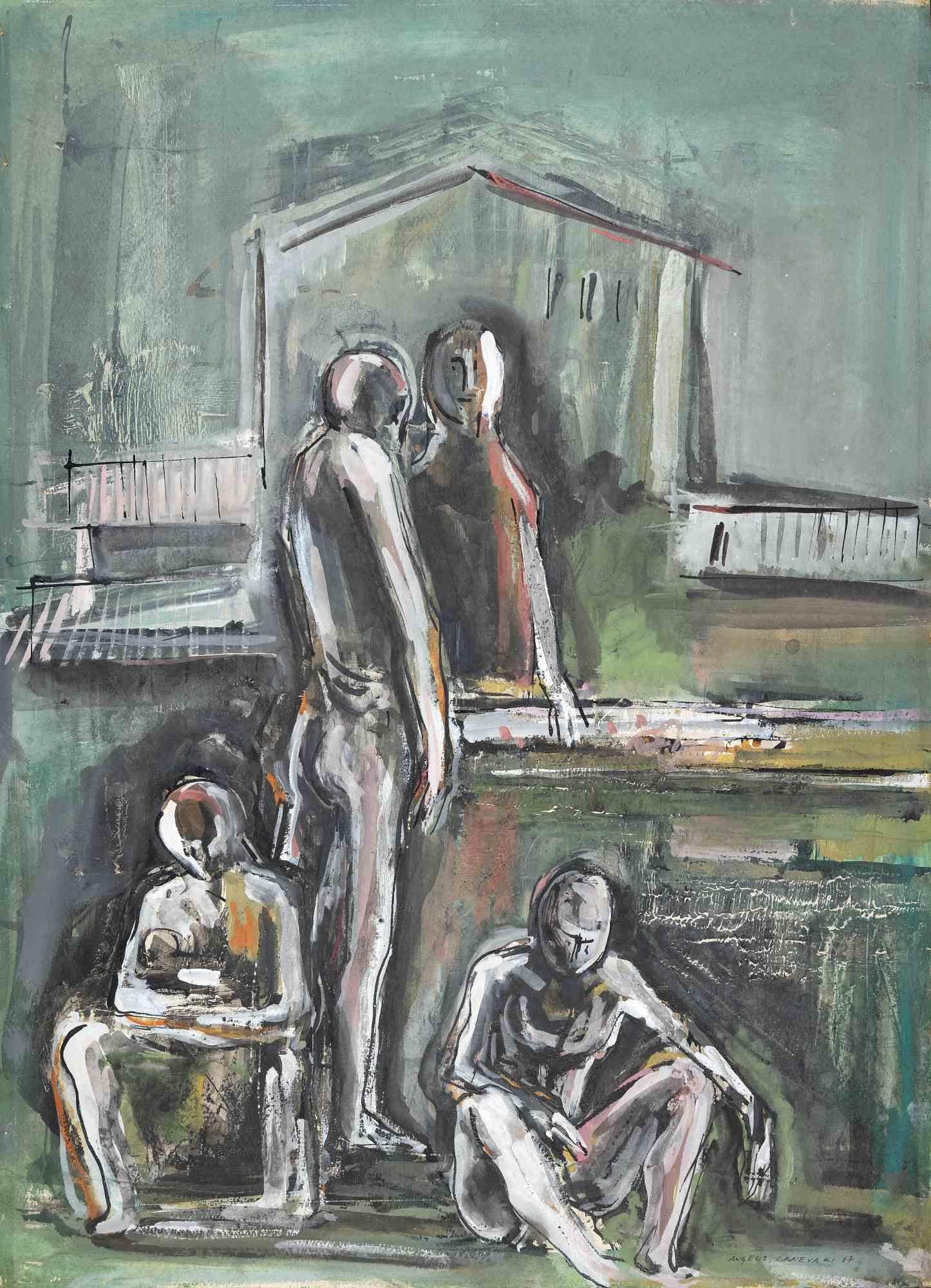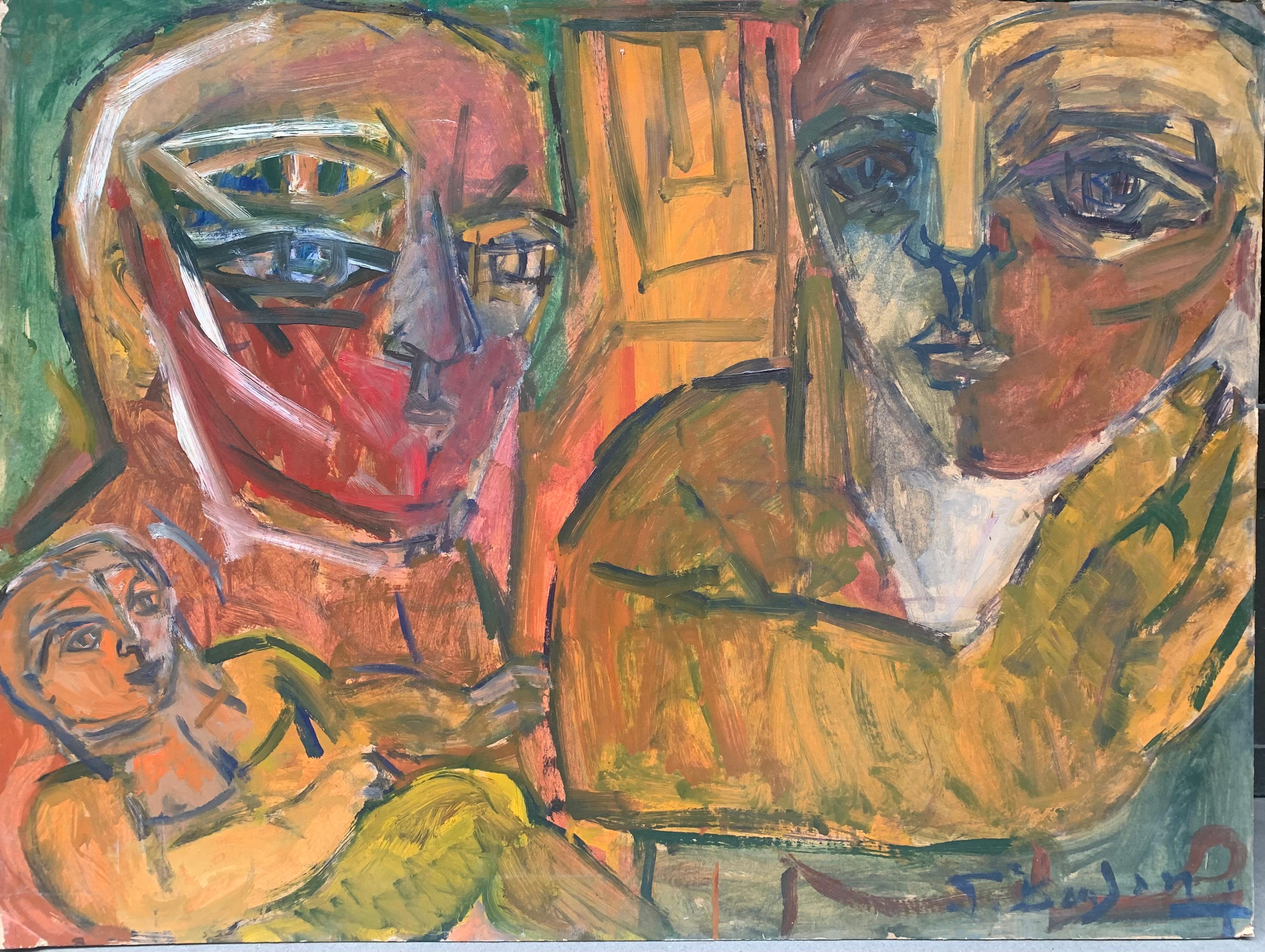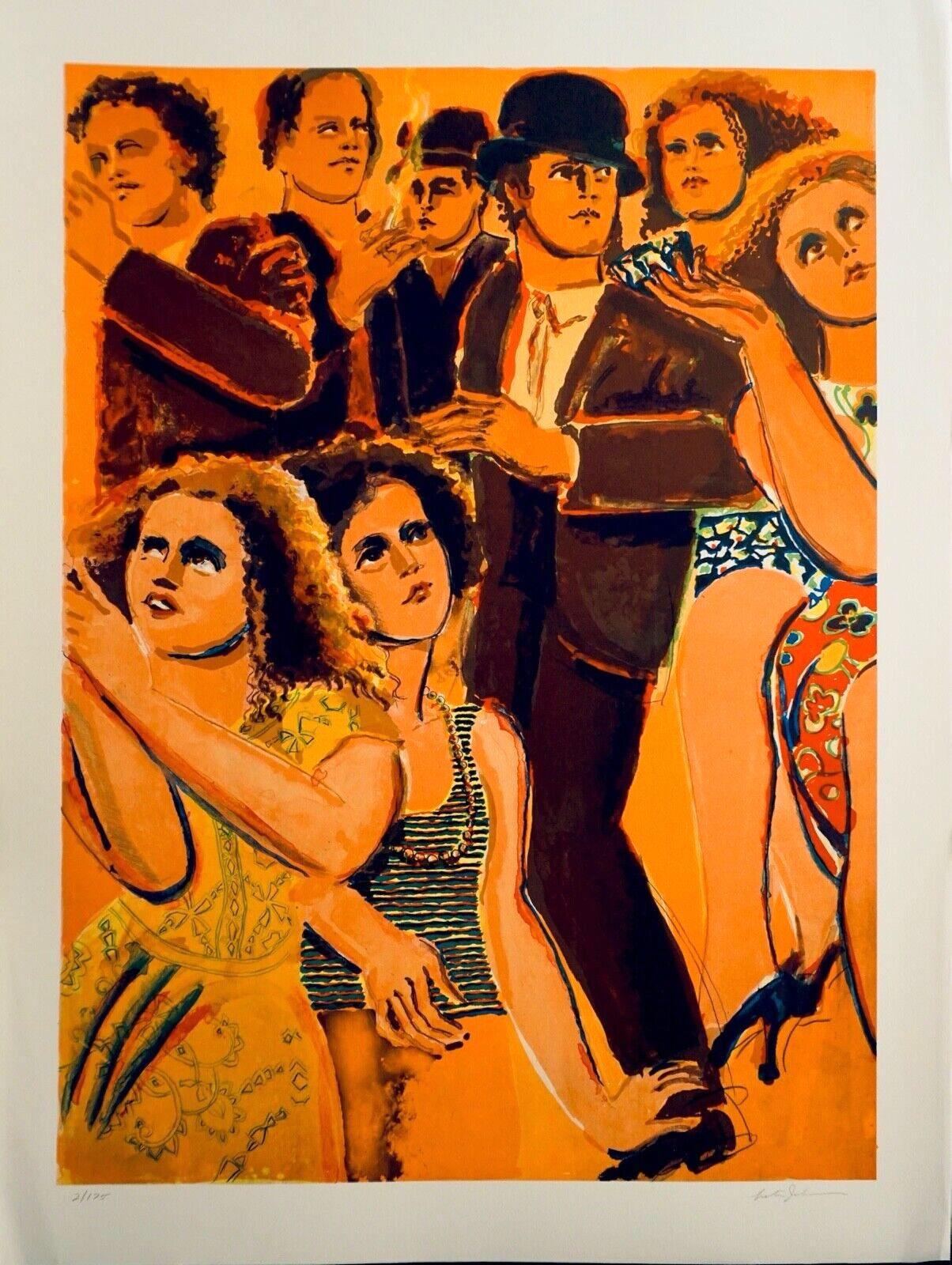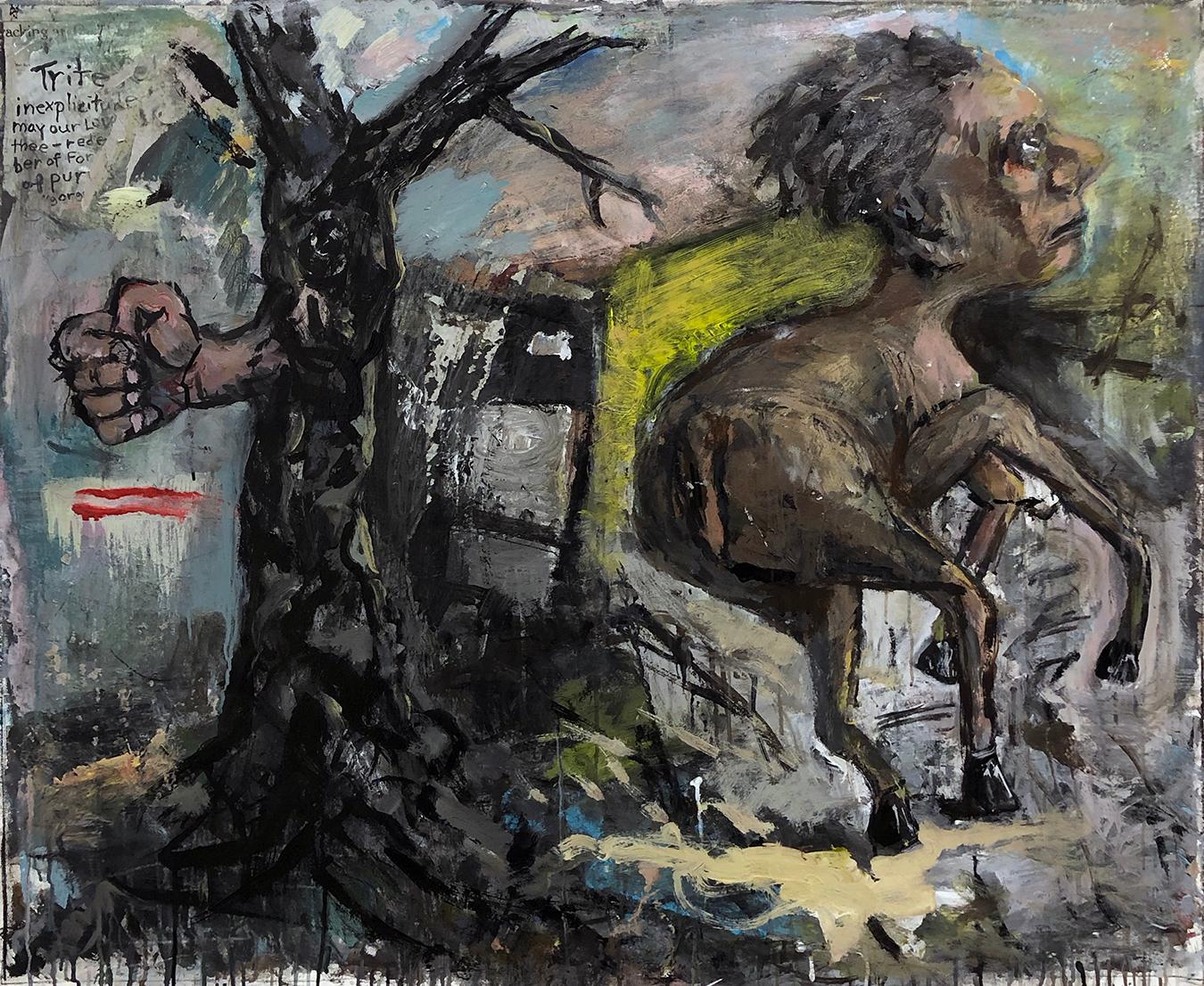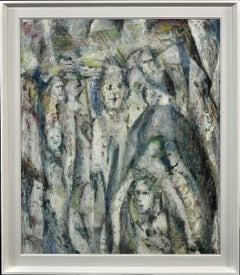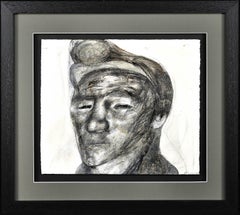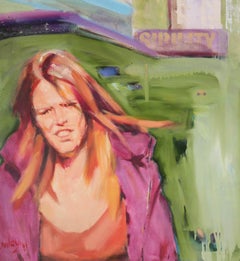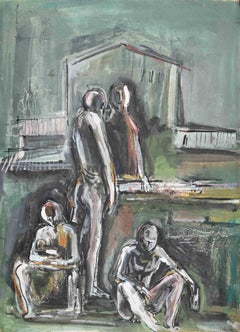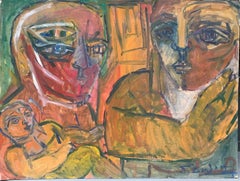Items Similar to Knocked Out! Forest Fields 1970s Nottingham Real Life Childhood Street Drama
Want more images or videos?
Request additional images or videos from the seller
1 of 21
Paul Anthony WaplingtonKnocked Out! Forest Fields 1970s Nottingham Real Life Childhood Street Drama1971
1971
$5,372.64
£3,895
€4,588.74
CA$7,379.84
A$8,205.96
CHF 4,295.97
MX$100,237.33
NOK 53,983.07
SEK 50,781.89
DKK 34,254.62
About the Item
Paul Anthony Waplington.
English ( b.1938 ).
Knocked Out! Forest Fields, Nottingham, 1971.
Mixed Media On Board.
Signed Lower Right.
Image size 29.5 inches x 38.4 inches ( 75cm x 97.5cm ).
Frame size 30.3 inches x 39.2 inches ( 77cm x 99.5cm ).
Available for sale; this original painting is by the Nottingham artist Paul Waplington and dates from 1971.
The painting is presented and supplied in its original anodized light metal frame (which is shown in these photographs).
The painted surfaces and the board have benefitted from cleaning and conservation which was performed on our instruction, supervision and approval.
This vintage painting is now in very good condition, commensurate with its age. It wants for nothing and is supplied ready to hang and display.
The painting is signed lower right.
Paul Waplington, is a self-taught working class artist, born and brought up in Nottingham. His father was a milkman. He hated his rough school and failed his 11 plus, and left school as soon as he could at 15. He wanted to be an artist but, without qualifications, was rescued by the lace industry where he got a job earning £1 a week as an apprentice draftsman, designing lace. He liked the job and over the next six years became highly skilled. At 21 he was however made redundant. He then went abroad for a while, to Belgium, where he worked as a pavement artist, and was introduced to by new friends to active politics.
Once back in the UK he became politically active, taking part in the Vietnam solidarity campaign, and the Young Communists League activities, although he never joined any political group. He focused on movements, including the status of ordinary people, including the Labour and trade union movements.
He returned to work in the lace industry, doing freelance work and teaching art classes. From the 1970s he painted professionally and tried his hand at landscapes, both locally and around Devon. He did not want to “sell out” to commercial tastes though and began to draw and paint what he saw, the terraced streets and factories around him. He also attended life classes at the Nottingham Society of Artists. His main subjects were to be workplaces and workers in their everyday environment. His works reflected affection and respect, but not sentimentality. He evolved a beautifully rhythmic, gutsy style and a quirky sense of perspective and detail to capture the liveliness of the scenes around him.
His art had a political dimension, which is to praise ordinary working life, but had no stated agenda beyond that. He produced a solid and evocative body of work that both celebrated Nottingham and its human communities and portrayed the industrial decline that helped to undermine them.
Waplington became a familiar and active figure in the British art scene in the 1970s and 80s, rising to critical notoriety after a significant exhibition at the Midland Group in 1978.
In 1988, the lace business in Nottingham had all but collapsed and Paul, who was still designing for the trade in Italy and Spain, moved to northern Portugal. There, he bought and restored a ruined small -holding, learnt Portuguese, married Fatima and settled down. Then he gradually started to draw and paint again, this time not terraced streets but fields and the farmers who lived and worked on them. His former beautiful sense of rhythm came back as he expressed his admiration for peasant architecture, and a sense of goodwill towards the people who eked out a tough existence in the granite hills. Although his Portuguese work is in the rich Mediterranean hues of the countryside, his art still celebrates the ordinary man and is an unblinkered, heartfelt response to a hard but rich way of life that is rapidly being lost. Paul still lives in Portugal, near to Covas, with his wife, Fatima.
In November 2013 to January 2014 there was a fine and long-overdue solo retrospective of Waplington’s art at Nottingham Castle. Waplington came back from Portugal for the opening and gave an afternoon talk. The show was in three parts, one being devoted to a documentary that was made about him and the work he did in the lace industry, the other two parts being dedicated to paintings of the steel and coal industries in Sheffield, Leicestershire and Nottinghamshire in the 1980s and paintings of life in inner-city Nottingham, mainly in the 1970s. His portrayals of the decline of the mining industry in the region was very much in the proud tradition of the Pitmen Painters of the 1930s. At the centre of the Nottingham Castle exhibition was the large banner Waplington painted in 1986 for Hucknall NUM, commemorating the 1984-5 miner’s strike.
Today the body of work that Waplington left in the UK are a colorful, vivid and exciting depiction of an era that has gone. His work now belongs to many public collections, including Glasgow Museums, Sheffield City Gallery, Sheffield University, Manchester City Galleries, Leicestershire County Council, the Arts Council Collection and Nottingham University NHS Trust.
© Big Sky Fine Art
This original mixed media work was painted by the artist in 1971. He has directly described to us how he had just finished a day’s work in the factory and was walking home on Harcourt Road, Forest Fields, Nottingham. His wife ran towards him, with their young son Martin limp in her arms. The young lad had been playing with other children in the street and had been struck with a stick. Martin had been knocked unconscious and his mother had been fetched. She now ran with the child to fetch help, frantic with panic. The artist was so struck with the emotion of the moment that he later felt compelled to capture the scene.
In the background are the red brick terraced houses of the cityscape, with their sash windows and squat chimneys.
- Creator:Paul Anthony Waplington (1938, English)
- Creation Year:1971
- Dimensions:Height: 30.32 in (77 cm)Width: 39.18 in (99.5 cm)
- Medium:
- Movement & Style:
- Period:
- Condition:This vintage painting is in very good condition, commensurate with its age. It wants for nothing and is supplied ready to hang and display.
- Gallery Location:Sutton Poyntz, GB
- Reference Number:1stDibs: LU489314110652
About the Seller
5.0
Gold Seller
Premium sellers maintaining a 4.3+ rating and 24-hour response times
Established in 2010
1stDibs seller since 2016
123 sales on 1stDibs
Typical response time: 1 hour
- ShippingRetrieving quote...Shipping from: Sutton Poyntz, United Kingdom
- Return Policy
Authenticity Guarantee
In the unlikely event there’s an issue with an item’s authenticity, contact us within 1 year for a full refund. DetailsMoney-Back Guarantee
If your item is not as described, is damaged in transit, or does not arrive, contact us within 7 days for a full refund. Details24-Hour Cancellation
You have a 24-hour grace period in which to reconsider your purchase, with no questions asked.Vetted Professional Sellers
Our world-class sellers must adhere to strict standards for service and quality, maintaining the integrity of our listings.Price-Match Guarantee
If you find that a seller listed the same item for a lower price elsewhere, we’ll match it.Trusted Global Delivery
Our best-in-class carrier network provides specialized shipping options worldwide, including custom delivery.More From This Seller
View AllEnigma 1960s Eccentric And Bohemian Framed Original Welsh Abstract Oil Painting
By Meryl Watts
Located in Sutton Poyntz, Dorset
Meryl Watts.
English ( b.1910 – d.1992 )
Enigma.
Oil On Board.
Signed Lower Right.
Image size 22.4 inches x 19.3 inches ( 57cm x 49cm ).
Frame size 26.4 inches x 22.8 inches ( 67cm x 58cm ).
Available for sale; this original oil painting is by Meryl Watts and dates from the mid-1960s.
The painting is presented and supplied in its’ original hand painted frame (which is shown in these photographs).
This vintage painting is in very good condition, commensurate with its age. It wants for nothing and is supplied ready to hang and display.
The painting was created whilst Watts resided at 1 Bron Avon, Borth-y-Gest, Porthmadog. (Today’s postcode would be LL49 9TU).
The painting is signed lower right.
Meryl Watts was born on the 5th April 1910, the only child of Charles and Evelin Watts. They lived in Germains Place, Blackheath and she was raised in east end of London where her father was a printer.
She studied at the Blackheath Art School, where the Principal was John Edgar Platt, one of the major artists using the technique of color woodcut. She learned this technique from Platt and was influenced by his style, as shown in the attractive and colorful designs that she subsequently produced.
Meryl began to work independently in 1937, producing her own work while still living in Blackheath. During World War II the family home and business were destroyed by German bombing and Meryl and her parents were given just a few hours to collect whatever valuables they could before their house was demolished to protect neighboroughing properties from further damage. As a consequence much of her early work was lost.
Having left their home the family evacuated to Portmeirion in Wales, where they had frequently stayed on holiday before the war. They struck up a friendship with the Portmeirion architect and founder, Sir Clough William-Ellis. Portmeirion was founded in 1925 and took nearly fifty years to complete. It was a homage to Sir William-Ellis’ love of the Italian Riviera and incorporated the grounds of a twelfth century castle. The resort became extremely popular with tourists and was the backdrop for various TV programs and films, including The Prisoner. Meryl Watts became artist in residence at Portmeirion, and over the next few years she produced an abundance of artwork including sketches, oil paintings and watercolors of famous scenes from the Snowdonia coastal region and other traditional landmarks. This was a new and very successful chapter of her artistic career.
From Portmeirion Meryl and her parents moved to a rented house in Borth-Y-Gest, Caernarvonshire, North Wales. In 1944 Meryl’s father purchased the house and Meryl began to work there, using the endless views in the area for her inspiration. After the death of her father in 1957 and her mother in 1969 Meryl lived alone in Borth-y-Gest until she married Professor Joseph Allen...
Category
Mid-20th Century Abstract Abstract Paintings
Materials
Oil, Board
Vows Are Spoken Only To Be Broken Circa 1965 The Flip Hairstyle Cornish Nude
Located in Sutton Poyntz, Dorset
Tony Giles.
English ( b.1925 - d.1994 ).
Vows Are Spoken Only To Be Broken.
Oil On Board.
Signed Lower Right.
Image size 39.6 inches x 29.5 inches ( 100.5cm...
Category
Mid-20th Century Modern Nude Paintings
Materials
Oil
Why Do You Come Here? 1980s Vintage Painting Neo-Classical Expressionist Style
Located in Sutton Poyntz, Dorset
Mary Dinsdale.
English ( b.1920 - d.2011 ).
Why Do You Come Here?
Watercolor & Gouache.
Signed Lower Left.
Image size 17.5 inches x 25.4 inches ( 44.5cm x 64.5cm ).
Frame size 26.6 i...
Category
Late 20th Century Expressionist Figurative Paintings
Materials
Watercolor, Gouache
Portrait Of A Welsh Coal Miner 1970s Mixed Media Artwork Mining In South Wales
By Jack Crabtree
Located in Sutton Poyntz, Dorset
Jack Crabtree.
English ( b.1938 ).
Welsh Coal Miner.
Mixed Media.
Signed Lower Right.
Image size 14.8 inches x 17.5 inches ( 37.5cm x 44.5cm ).
Frame size 23.4 inches x 26.2 inches...
Category
Mid-20th Century Realist Figurative Paintings
Materials
Mixed Media
Lost Hedgerows Framed Environmental Activism Pastel Artwork Late 20th Century
By Julian Ruddock
Located in Sutton Poyntz, Dorset
Julian Ruddock.
British ( b.1965 ).
Lost Hedgerows.
Pastel On Paper.
Signed Lower Right.
Image size 21.9 inches x 25 inches ( 55.5cm x 63.5cm ).
Frame size 29 inches x 32.1 inches ...
Category
Late 20th Century Expressionist Figurative Drawings and Watercolors
Materials
Paper, Pastel
The First Day At School In Rural Wales Framed Welsh Cultural Pastel Artwork
By Julian Ruddock
Located in Sutton Poyntz, Dorset
Julian Ruddock.
British ( b.1965 ).
To School In Llanfihangel. (First Day At School).
Pastel On Paper.
Signed Lower Left.
Image size 21.7 inches x 29.6 inches ( 55cm x 75cm ).
Frame...
Category
Late 20th Century Expressionist Figurative Drawings and Watercolors
Materials
Paper, Pastel
You May Also Like
Clifford Hanley (1948-2021) - 20th Century Oil, Oxford St. Burst
Located in Corsham, GB
An vibrant modernist composition by artist Clifford Hanley, depicting a female figure caught in serious thought on the busy streets of Oxford. The painting is signed and dated to the...
Category
21st Century and Contemporary Portrait Paintings
Materials
Oil
$414 Sale Price
20% Off
The Morning After
By John Hardy (Artist)
Located in Long Island City, NY
The Morning After
John Hardy, American (1923–2014)
Date: 2007
Oil on Canvas, signed
Size: 48 x 60 in. (121.92 x 152.4 cm)
Category
Early 2000s Contemporary Figurative Paintings
Materials
Oil
At the End Of The Night - Painting by Angelo Canevari - 1967
By Angelo Canevari
Located in Roma, IT
At the End Of The Night is an original painting in Tempera, ink, and watercolor on paper realized by Angelo Enrico Canevari in 1967
Hand-signed on the lower, and dated, titled in I...
Category
1960s Drawings and Watercolor Paintings
Materials
Tempera
Patrick Boudon. Inner Family. Post-war Expressionism. 1970s.
By Patrick Boudon
Located in Firenze, IT
Patrick Boudon.
Inner Family.
Post-war Expressionism.
1970s.
Patrick Boudon.
Art Informel. Ecole de Paris.
Technique: oil on cardboard.
This painting by Patrick Boudon from the 197...
Category
1970s Expressionist Figurative Paintings
Materials
Oil, Cardboard
$477 Sale Price
20% Off
Free Shipping
Street Scene 4
By Lester Johnson
Located in Hollywood, FL
Artist: Lester Johnson
Title: Street Scene 4
Medium: Lithograph
Signed: Hand Signed
Edition: Edition of 175
Measurements: 29" x 21"
Year: 1978
Note: This piece is sold UNFRAMED
Con...
Category
1970s Contemporary Figurative Prints
Materials
Lithograph
"Outskirts", acrylic painting, duality, nature, humanity, chaos, dream, myth
Located in Toronto, Ontario
"Outskirts" is an acrylic painting with collage elements on canvas, measuring 38" high by 44" wide. There's nowhere to hide in any of William's paintings, that's part of the charge coming off his canvases. That's particularly true with this painting – we immediately see that everything is wrong, hands coming out of trees, a human head on a horse or dog. Yes it's Mythic but even there it's wrong, the legs are impossibly crossed. In fact little of this painting can be true and yet here it is. Out of control, left over and residual ways and means of living life. Who or what are we now?
Press Release 2018: "Williams acknowledges a large range of influences on his vision: the moral lessons embodied in the works of 17th century engraver Jacques Lagniet, the darkling phantasms and tragic reportage of Goya’s Caprichos...
Category
21st Century and Contemporary Neo-Expressionist Figurative Paintings
Materials
Canvas, Acrylic
